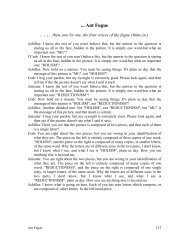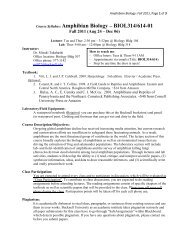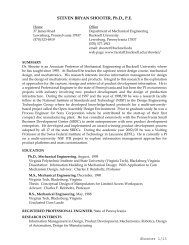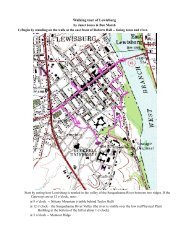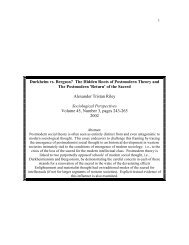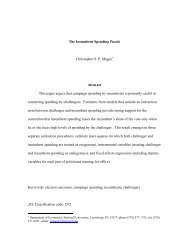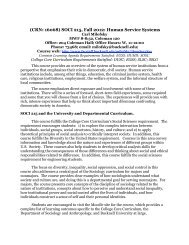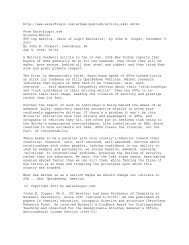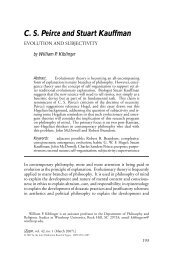The Organ of Theopathy - Bucknell University
The Organ of Theopathy - Bucknell University
The Organ of Theopathy - Bucknell University
Create successful ePaper yourself
Turn your PDF publications into a flip-book with our unique Google optimized e-Paper software.
<strong>The</strong> <strong>Organ</strong> <strong>of</strong> <strong>The</strong>opathy: John Ludlow & the Emergence <strong>of</strong><br />
British Christian Socialism, 1848-54<br />
James Mark Shields ©1994, revised 2007<br />
ABSTRACT<br />
Christian Socialism in the United Kingdom did not spring out <strong>of</strong> nowhere, but was deeply enmeshed within not only 19 th -century<br />
European socialism and the British labor movement, but also the history <strong>of</strong> radicalism in the English church and within English<br />
Christianity more generally. Indeed, for many centuries radical political and social movements—as well as thought—in Britain<br />
were inextricably linked with religious underpinnings. In the early 19 th -century, however, Robert Owen became the spokesman<br />
for British socialism, and his arguments for the necessity <strong>of</strong> co-operation were accompanied by a harsh indictment <strong>of</strong> the intolerance<br />
and blindness <strong>of</strong> religious beliefs (most starkly expressed in his 1817 “Denunciation <strong>of</strong> All Religions”). By the 1830s,<br />
Owenite socialism was losing its impetus in the United Kingdom, and into this void stepped a man with a calling—to re-evoke<br />
the true spirits <strong>of</strong> Christianity as well the true meaning <strong>of</strong> Socialism, by combining the two. This man was John Ludlow (1821-<br />
1912?). This short paper is an analysis and reflection on Ludlow’s life and work in the context <strong>of</strong> the first wave <strong>of</strong> Christian socialism<br />
in the United Kingdom, from 1848-1854.<br />
Socialism, the latest born <strong>of</strong> the forces now at work in modern<br />
society, and Christianity, the eldest born <strong>of</strong> those forces, are<br />
in their nature not hostile, but akin to each other; or rather,<br />
the one is but the development, the outgrowth, the manifestation<br />
<strong>of</strong> the other.<br />
– John Ludlow<br />
Despite appearances, British Christian Socialism did not<br />
spring out <strong>of</strong> nowhere, fully armed, like Athena from the head<br />
<strong>of</strong> Zeus, but was in fact deeply enmeshed within not only 19 th -<br />
century European socialism and the British labor movement,<br />
but also the history <strong>of</strong> radicalism in the English church and<br />
within English Christianity more generally—from the holy<br />
triumvirate <strong>of</strong> 14 th -century peasant revolt, John Ball, Jack<br />
Straw, and Wat Tyler, through Thomas More’s communistic<br />
Utopia in 1516, to the Diggers <strong>of</strong> Winstanley and Everard,<br />
who in 1649 came into conflict with an unsympathetic Lord<br />
Protector. Indeed, one cannot begin to understand this movement<br />
without some knowledge <strong>of</strong> these particular incidents<br />
along with the difficult period following the Industrial Revolution<br />
in Europe, the so-called “Iron Age” which caused such<br />
upheavals in all aspects <strong>of</strong> life and precipitated a wave <strong>of</strong> social<br />
criticism on numerous fronts, even or especially the poetic,<br />
where William Blake railed:<br />
In every cry <strong>of</strong> every Man,<br />
In every Infants cry <strong>of</strong> fear,<br />
In every voice: in every ban,<br />
<strong>The</strong> mind-forg’d Manacles I hear.<br />
While it is undeniable that radical political and social<br />
thought in Britain was inextricably linked with its religious<br />
roots, this connection was one fraught with tension. In the<br />
early 19 th -century, Robert Owen became the spokesman for<br />
British socialism, and his arguments for the necessity <strong>of</strong> cooperation<br />
were accompanied by a harsh indictment <strong>of</strong> the<br />
intolerance and blindness <strong>of</strong> religious beliefs (most starkly<br />
expressed in his 1817 “Denunciation <strong>of</strong> All Religions”). Thus,<br />
though initiated by an attempt to “purify” the Christian spirit,<br />
British socialism in the early Victorian period became largely<br />
atheistic, unlike some continental visions (such as Saint-<br />
1<br />
Simonism) but akin to the various forms <strong>of</strong> Marxism that<br />
would overwhelm the left at the end <strong>of</strong> the 19 th century and<br />
into the 20 th . Owenite socialism, however, was, by the 1830s,<br />
losing its impetus, and into this situation stepped a man with a<br />
calling: to re-evoke the true spirits <strong>of</strong> Christianity as well the<br />
true meaning <strong>of</strong> socialism, by somehow combining the two.<br />
This man was John Ludlow.<br />
Early Life & Influences<br />
John Malcolm Ludlow was born in 1821—in the same year as<br />
Baudelaire and Dostoevsky, and three years after Karl Marx—<br />
in India, where his father, a British colonel, was stationed. His<br />
early years were spent in Paris, where he lived with his mother<br />
and sisters following his father’s death, and it was in the<br />
French capital that he received his education at the Collége<br />
Bourbon, an elite school in the period <strong>of</strong> the Second Republic.<br />
Though he moved to London as a young man, to study for the<br />
Bar, Ludlow kept in close contact with France throughout his<br />
life, and the shaping <strong>of</strong> his mind, especially in terms <strong>of</strong> his<br />
radical political views, was steeped in this Parisian connection.<br />
One man with whom Ludlow maintained contact was Alexandre<br />
Vinet, an evangelist Protestant who, it is said, was the<br />
first to use the term socialisme in its modern sense. Ludlow<br />
felt challenged and invigorated by the work <strong>of</strong> Vinet and<br />
Louis Meyer, a Lutheran pastor who founded the Society <strong>of</strong><br />
Friends <strong>of</strong> the Poor. In London, Ludlow determined to do<br />
something for the poor, whom, in his day, were mired in the<br />
miasma <strong>of</strong> rampant industrialization so well documented in<br />
Friedrich Engels’s Condition <strong>of</strong> the Working-Class in England,<br />
a work published in 1844, when Ludlow was twentythree.<br />
In this bitter exposé, Engels notes “the deep wrath <strong>of</strong><br />
the whole working-class, from Glasgow to London, against<br />
the rich, by whom they are systematically plundered and mercilessly<br />
left to their fate.” 1 But how was Ludlow to remedy<br />
these ills, while promoting Christian brotherhood as a channel<br />
for the wrath <strong>of</strong> the poor? He saw, like Engels, the overwhelming<br />
brutality <strong>of</strong> the effects <strong>of</strong> urban poverty under capitalist<br />
industrialism, and recognized that personal charity,<br />
whether framed in terms <strong>of</strong> Christianity or aristocratic virtue,
was not enough to stem the tide <strong>of</strong> squalor and misery. He<br />
concluded that, in fact, with charity “[n]o serious effort [i]s<br />
made to help a person out <strong>of</strong> his or her misery, but only to<br />
help him or her in it.” 2 That is, charity and good feelings only<br />
perpetuate the dependence and servility <strong>of</strong> the receivers, without<br />
touching on the deeper levels <strong>of</strong> the problem; i.e., without<br />
transforming the entire system in which the poor were enslaved.<br />
<strong>The</strong> Founding <strong>of</strong> British Christian Socialism<br />
With these ideas spinning in his head, upon coming to the<br />
English capital, Ludlow lost no time in contacting the popular<br />
if slightly unorthodox chaplain <strong>of</strong> Lincoln’s Inn (where Ludlow<br />
was studying for the Bar): Frederick Denison Maurice.<br />
<strong>The</strong>ir meeting, though at first inconclusive, would prove to be<br />
a seminal event in the history <strong>of</strong> Christian Socialism in Britain.<br />
Eventually, Ludlow was to persuade Maurice to embrace<br />
“socialism” as the fulfillment <strong>of</strong> the true Christian message—<br />
embodied in relief for the poor and solidarity with the workers.<br />
Frederick Maurice was a charismatic figure, generally<br />
adored by those with whom he had any contact. His own religion<br />
was based in the Christian spirit <strong>of</strong> humility, which was<br />
infused in his life and blood. Charles Raven says that it was<br />
this “complete drenching <strong>of</strong> his whole being in Christianity”<br />
that forced him to apply religion socially. 3 Maurice’s theology<br />
was largely Johannine, influenced by the Logos-theology <strong>of</strong><br />
the Greek fathers; he stressed in particular the spiritual and<br />
moral over the intellectual aspects <strong>of</strong> the human-divine relationship.<br />
Such a stance enabled Maurice to espouse the “progressive”<br />
and “educative” nature <strong>of</strong> historical revelation,<br />
which, through the guiding light <strong>of</strong> fellowship, brings people<br />
closer and closer to God. Ever fearful <strong>of</strong> partisanship and<br />
schism, Maurice embraced the principle <strong>of</strong> Unity, calling for<br />
such in terms <strong>of</strong> both nation and church. Ludlow’s verve and<br />
crusading spirit roused Maurice to ever-greater heights <strong>of</strong><br />
eloquence, but he never abandoned these principles, <strong>of</strong>ten to<br />
the dismay <strong>of</strong> the more direct and combative Ludlow. Like<br />
John Wesley’s Methodists, he aspired to be “the friend <strong>of</strong> all<br />
and enemy <strong>of</strong> none.”<br />
<strong>The</strong> year 1848 proved crucial for Ludlow and Maurice,<br />
as it was, indeed, for Europe as a whole: revolutions broke out<br />
all across the continent, and a short tract was published by two<br />
young Germans living in England called <strong>The</strong> Communist<br />
Manifesto. Ludlow, however, was more influenced by the<br />
political rumblings in France than in the printed exhortations<br />
<strong>of</strong> Marx and Engels. He hurried to Paris and imbibed the ideas<br />
<strong>of</strong> association and worker co-operation that filled the air. It<br />
was at this point that Ludlow became convinced that it was his<br />
calling to “Christianize Socialism”—out <strong>of</strong>, if nothing else,<br />
the realization that, if Christianity were not to meet the challenges<br />
<strong>of</strong> the day, it would soon be swallowed up by socialism,<br />
which, he proclaimed, “appealed to the higher… instincts<br />
<strong>of</strong> the working-class.” 4<br />
It was on April 10 <strong>of</strong> that year, 1848 that Christian Socialism<br />
was <strong>of</strong>ficially born as a movement in Britain. Maurice<br />
introduced Ludlow to Charles Kingsley, a young and energetic<br />
Anglican minister (and soon to be popular novelist), and the<br />
three produced a leaflet addressed to the “Workmen <strong>of</strong> England,”<br />
which they distributed among the crowds returning<br />
from the dispersed Chartist protest at Kensington Common on<br />
2<br />
that day. <strong>The</strong> Chartist labor movement, which developed in<br />
response to the Reform Bill <strong>of</strong> 1832 that restricted the franchise,<br />
and the repealing <strong>of</strong> Elizabeth’s Poor Laws in 1834<br />
(which eliminated all outdoor relief), demanded in their People’s<br />
Charter universal suffrage, annual parliaments, voting<br />
by ballot, equal electoral districts, and the elimination <strong>of</strong> property<br />
qualifications for voters. <strong>The</strong> established Church <strong>of</strong> England<br />
turned a deaf ear to Chartism, and the Chartists in turn,<br />
following Owen, cut themselves <strong>of</strong>f from Christianity and the<br />
Church. April 10 was a dark day for Chartism: at Kensington<br />
Common they were rudely dispersed by the police, signaling,<br />
for at least one continental socialist (Engels) the end <strong>of</strong> the<br />
early British labor movement.<br />
But others saw light amid the gloom. It was this split, between<br />
the Chartists and the Church, that Ludlow, Morris and<br />
Kingsley sought to heal. Though their political sympathies<br />
may not have been identical (Maurice and Kingsley were<br />
more traditional Tory critics, whereas Ludlow was a French<br />
socialist), they proclaimed their collective solidarity with the<br />
workers. Unfortunately, despite their laudable intentions, their<br />
first edict was mired in a rather patronizing and somewhat<br />
naïve call to temperance on the part <strong>of</strong> the agitators: “[T]here<br />
will be,” it states, “no true freedom without virtue, no true<br />
science without religion, no true industry without the fear <strong>of</strong><br />
God, and love to your fellow-citizens.” 5 In time, Ludlow especially<br />
came to see that such l<strong>of</strong>ty, and very bourgeois intentions<br />
would not suffice, and that the Christian Socialist movement<br />
must make direct contact with the labor movement, the<br />
remnants <strong>of</strong> the weakened Chartists in particular, if it were to<br />
progress.<br />
To this end, the three began a weekly paper entitled Politics<br />
for the People, a short-lived project (lasting only 17 issues)<br />
that nonetheless set forth the basic principles <strong>of</strong> Christian<br />
Socialism. Most significant for the Christian Socialists,<br />
and perhaps the most important aspect <strong>of</strong> their legacy, is their<br />
expanded conception <strong>of</strong> politics, which, they argue, cannot be<br />
restricted to the narrow world <strong>of</strong> political emancipation and<br />
economic self-determination, but must reflect upon all levels<br />
<strong>of</strong> existence, particularly, as can be seen in the extract from an<br />
article on the National Gallery, the aesthetic (see Appendix<br />
A). Ludlow soon, however, split from his colleagues in his<br />
refusal to be, as he put it—“carried away by Platonistic<br />
dreams about an Order, and a Kingdom, and a Beauty, selfrealized<br />
in their own eternity.” 6 Such, he wrote to Maurice, is<br />
neither true Christianity nor true Socialism.<br />
Ludlow’s Vision: Politics and Christianity<br />
Ludlow, <strong>of</strong> course, had the benefit <strong>of</strong> a French education and<br />
an upbringing in a society at the time much more in tune with<br />
ideas <strong>of</strong> democracy, freedom and equality; principles engrained<br />
in the French psyche with a hammer (or, one could<br />
say, more cynically, with a guillotine) from 1789. His socialism,<br />
and thus his Christian Socialism, did not rely nearly as<br />
much upon the Tory critics such as Edmund Burke, Thomas<br />
Carlyle and later, John Ruskin and Matthew Arnold. <strong>The</strong> peculiarity<br />
<strong>of</strong> British socialism is due in large part to the influence<br />
<strong>of</strong> these men, who criticized the industrial system and its<br />
effects, not from the side <strong>of</strong> equality and rights but rather from<br />
the side <strong>of</strong> stability, tradition, and obligation. Besides Ball,<br />
Straw, Tyler, the Diggers and Robert Owen, British socialism<br />
and the Christian Socialism <strong>of</strong> Maurice and Kingsley relied
very much upon these “conservative” figures, as well as the<br />
writings <strong>of</strong> two Romantic poets—Robert Southey and Samuel<br />
Taylor Coleridge. Southey, though influenced by Owen, hated<br />
the anti-aesthetic soulessness <strong>of</strong> capitalist industrialism above<br />
all, and proclaimed that Owen’s failure was due to his lacking<br />
“the organ <strong>of</strong> theopathy.” 7 Coleridge, friend <strong>of</strong> Wordsworth<br />
and Southey, extended this theme, deepening it through a<br />
study <strong>of</strong> German philosophy; it was he who persuaded John<br />
Stuart Mill to turn away from strict Benthamite utilitarianism,<br />
and who prepared the way for Carlyle and his followers.<br />
<strong>The</strong>se men were not Jacobite radicals like Shelley or Byron<br />
(who mercilessly blasts Southey as a reactionary turncoat in<br />
Don Juan and Visions <strong>of</strong> Judgement), but rather Tory philanthropists<br />
who stressed order, morality, beauty, temperance,<br />
and, to a varying degree, religion in social reform. Raven says<br />
that Christian Socialists in Britain “owed their inspiration to<br />
Carlyle and their opportunity to the Chartists.” 8<br />
Ludlow, however, could not accept the aristocratic elements<br />
inherent in such a stance, however critical <strong>of</strong> the existing<br />
state <strong>of</strong> things. Though he did emphasize duties over rights<br />
(a classical Tory preference), he was not ready to become a<br />
Carlylean hero-worshipper or a Ruskinian aesthete. Whereas<br />
Maurice cautioned against democracy as setting the Will <strong>of</strong><br />
the People in place <strong>of</strong> the Will <strong>of</strong> God, Ludlow saw in monarchy<br />
a usurpation <strong>of</strong> the Will <strong>of</strong> God into the Will <strong>of</strong> One Man.<br />
Democracy, full democracy, was imperative as “the interior<br />
self-control <strong>of</strong> individuals” over their lower nature, as well as<br />
for self-government, the “giant self-control <strong>of</strong> a nation.” 9 Furthermore,<br />
he continues, “the truest democracy appears to me<br />
to be—Socialism.” 10 Trade and industry had become tyrannical<br />
because they had lost touch with God and the love <strong>of</strong> humanity;<br />
religion had fallen from glory through forgetting it<br />
true mission—to save, not itself, but the world. Thus, humankind<br />
was faced with a double task: political and economic<br />
emancipation on the one hand, and individual reform and<br />
spiritual liberty on the other. <strong>The</strong>se must, Ludlow insisted, be<br />
carried on simultaneously.<br />
Here Ludlow evokes a young Marx, for whom<br />
communism meant spiritual and moral as well as political and<br />
economic liberation. Like Maurice, whose theology Ludlow<br />
imbibed (if not his politics or views on the means <strong>of</strong> reform) it<br />
was fellowship that would root and guide all revolution:<br />
“When [the sense <strong>of</strong> fellowship] is once rekindled, it will be<br />
found that its sphere is all-embracing.” 11 This rekindling he<br />
saw coming in a "great religious awakening" among the workers,<br />
whose disdain for priest- or preacher-following was a<br />
clear sign <strong>of</strong> their readiness for true Christianity.<br />
In some ways, the Christian Socialists reacted to the<br />
Oxford Movement (which Ludlow despised, associating it<br />
with his own experience <strong>of</strong> French Catholicism), writing a<br />
new set <strong>of</strong> “tracts for the times” that purported to be much<br />
more in touch with the needs <strong>of</strong> the age in the light <strong>of</strong> revealed<br />
truth. But it was only with the inclusion in the Christian Socialist<br />
weekly meetings <strong>of</strong> a journeyman tailor and Owenite<br />
Chartist, Walter Cooper, that the movement began to establish<br />
a real connection with the people, and a turn away from middle-class<br />
niceties. At the Cranbourne C<strong>of</strong>fee tavern, their new<br />
“neutral” meeting place, Cooper invited many <strong>of</strong> his Chartist<br />
brethren to listen to the eloquence <strong>of</strong> Maurice, orator and<br />
spiritual father <strong>of</strong> Christian Socialism. Working with Cooper<br />
further radicalized Ludlow, who after a trip to Paris in 1849<br />
during which he studied workers’ co-operatives being set up<br />
3<br />
there, established with the Chartist leader the Society for the<br />
Promotion <strong>of</strong> Workingmen’s Associations in order to provide<br />
financial, legal, and technical assistance to labor associations.<br />
Though slowed by Maurice’s wary hand, Ludlow organized a<br />
Central Board with which to oversee the workings <strong>of</strong> the Society.<br />
Christian Socialism seemed to have healed the split<br />
perpetuated by Owen and the Church. No longer was the<br />
choice to be either/or between Revelation and Revolution—<br />
for Ludlow it could, indeed must be, both/and.<br />
Decline <strong>of</strong> British Christian Socialism<br />
<strong>The</strong> innate conservatism <strong>of</strong> Maurice proved, however, to be<br />
fatal to Ludlow’s dreams. Repeating the strange reluctance <strong>of</strong><br />
Erasmus, the Dutch humanist who, when given an opportunity<br />
to mediate between Rome and the Reformers in the early<br />
years <strong>of</strong> the Reformation inexplicably passed up on a golden<br />
opportunity, Maurice, in similar fashion, declined to attend a<br />
meeting called by the ASE, a major trade union, who <strong>of</strong>fered a<br />
full reconciliation <strong>of</strong> Chartism and Christian Socialism via a<br />
pledge <strong>of</strong> joint action against the employers in the name <strong>of</strong><br />
“the realization <strong>of</strong> associated labour.” 12 Maurice’s reluctance<br />
was to the Chartists a firm rebuff, and an admission that<br />
Christian Socialism, for all Ludlow’s claims, could not be<br />
reconciled with class struggle and the realities <strong>of</strong> English industrial<br />
life. Though Ludlow tried to pick up the pieces, it was<br />
too little too late, and the movement fizzled. <strong>The</strong> last meeting<br />
<strong>of</strong> the Society took place in January <strong>of</strong> 1855.<br />
For a time, a bitter Ludlow blamed Maurice, only later<br />
coming to see that the man whom he once called “the Master”—the<br />
Maurice he had devoted himself to—“was a<br />
Maurice <strong>of</strong> my own imagination.” 13 Maurice, who wanted to<br />
make Anglicanism into a “rational faith,” could never fully<br />
shake his Toryism—insisting that the Kingdom <strong>of</strong> God was<br />
already in existence on earth, and need only to be called forth<br />
by a return to righteousness on the part <strong>of</strong> the people. 14<br />
Yet the blame cannot be placed entirely upon the head <strong>of</strong><br />
Maurice, the Father <strong>of</strong> the movement; some must also devolve<br />
upon its Son and would-be-Redeemer, John Ludlow. Though<br />
he despised biblical rigorism, Ludlow was too much <strong>of</strong> a Puritan<br />
iconoclast to accept the aesthetic and idealist calls <strong>of</strong> the<br />
Tories and later socialists like William Morris. He could not<br />
fully accept the (Tory-inspired) “guild socialism” that was to<br />
become the most frequent face <strong>of</strong> the British labor movement<br />
in its later phases. This form <strong>of</strong> socialism, which resembles<br />
anarcho-syndicalism more than statist Marxism, rejects state<br />
ownership as central control in favor <strong>of</strong> worker control, functional<br />
democracy, and decentralization. In England, influenced<br />
no doubt by the Romantics, Tractarians, pre-Raphaelites, and<br />
the neo-Gothicism <strong>of</strong> John Ruskin, guild socialism was tinted<br />
with a mediaevalist ethos—a call to reclaim a lost Golden Age<br />
in the face <strong>of</strong> Industrial squalor. Ludlow could not abide<br />
Ruskin (who was a colleague <strong>of</strong> his at Maurice’s Workingmen’s<br />
College), he loathed the Oxford Movement leaders, and<br />
he dismissed Dante Gabriel Rossetti (also a colleague at the<br />
College) and his PRB brethren as being hopelessly “morbid”—including<br />
fellow Socialist agitator and PRB affiliate<br />
William Morris, with his “peculiar” (as Ludlow called it)<br />
brand <strong>of</strong> socialism.<br />
Peter Jones claims that guild socialism had much to <strong>of</strong>fer<br />
the Christian Socialists that collectivism did not: a decentralized<br />
system which would preserve individual choices and
freedoms; a guard against the secular excess <strong>of</strong> centralized<br />
administration, and an opportunity for more direct worker<br />
participation in government and the economy. “In its pluralism,<br />
Guild Socialism <strong>of</strong>fered protection for the churches in a<br />
secular world and seemed to vindicate the decentralized society<br />
<strong>of</strong> the medieval ideal, naturally attractive to the Anglican<br />
[particularly post-Tractarian] religious mind.” 15 Eventually,<br />
guild socialism was itself swallowed up by the “scientific”<br />
variety <strong>of</strong> Marxist collectivism, to the despair <strong>of</strong> some 20 th -<br />
century Marxian revisionists.<br />
Ludlow avoided such a course, and this may have<br />
been his failing. In rejecting Toryism, Ludlow escaped the<br />
idealistic and aristocratic elements <strong>of</strong> Maurice and Kingsley’s<br />
brand <strong>of</strong> socialism, but he also cut himself <strong>of</strong>f from the moral<br />
and aesthetic emphasis that filtered from Tory critics into<br />
guild socialism. Steeped in French socialism, which, especially<br />
in the works <strong>of</strong> Fourier and Saint-Simon, spoke a language<br />
<strong>of</strong> enforced and rigorously systematized collectivism<br />
(e.g., Fourier’s famous phalanxes so derided by one Tory<br />
critic as “parallelograms <strong>of</strong> paupers”), Ludlow may be an<br />
equal target to Marx and Engels in neo-anarchist Murray<br />
Bookchin’s remark that the “attempt to find a haven in fixed<br />
dogma and an organizational hierarchy as substitutes for creative<br />
thought and praxis is bitter evidence <strong>of</strong> how little many<br />
revolutionaries are capable <strong>of</strong> ‘revolutionizing themselves and<br />
things’, much less <strong>of</strong> revolutionizing society as a whole.” 16<br />
Like Marx and Engels, Ludlow was a committed centralist, as<br />
his overseeing “Central Board” demonstrates—a stance much<br />
feared by the British, for whom the memory <strong>of</strong> the French<br />
Reign <strong>of</strong> Terror was ever-present (a fear evoked throughout<br />
the 19 th -century, from Burke’s Reflections on the Revolution<br />
in France to Hillaire Belloc’s <strong>The</strong> Servile State.) Ironically,<br />
his rejection <strong>of</strong> the paternalism <strong>of</strong> the Tories in favor <strong>of</strong><br />
French collectivism led to a different sort <strong>of</strong> paternalism alltoo-familiar<br />
to 20 th -century Marxism: that <strong>of</strong> a vanguard<br />
(Christian) elite who were to lead the masses out <strong>of</strong> their<br />
darkness to Atonement.<br />
In another sense, Ludlow was too much <strong>of</strong> an evangelical<br />
to be able to pull <strong>of</strong>f his syncretistic dream: even his principle<br />
trope <strong>of</strong> “co-operation” was only useful ins<strong>of</strong>ar as it promoted<br />
the “Christianization” <strong>of</strong> society. His Puritan ideals could<br />
accept neither the anarchic idealism <strong>of</strong> Morris nor the Tory<br />
gradualism <strong>of</strong> Maurice. Any deviation from the confession <strong>of</strong><br />
faith in his Society was to him tantamount to apostasy—a<br />
stance that no doubt alienated those <strong>of</strong> his Chartist colleagues<br />
less religiously inclined. As heir to both the French and Puritan<br />
Revolutions, two radical movements not always the most<br />
democratic, Ludlow may have been fated to believe that only<br />
an imposed faith and a strong overall control could produce a<br />
Christian Socialist society. He predated Lenin in his insistence<br />
upon a vanguard that must direct, govern, and train the people<br />
in their own interests. But whereas for Lenin such uncompromising<br />
rigor was an advantage in the chaos <strong>of</strong> late-Tsarist<br />
Russia, the relatively pacific condition <strong>of</strong> England in the<br />
1850s, combined with characteristic British wariness to revolution,<br />
ultimately rendered Ludlow’s approach self-defeating.<br />
Conclusions<br />
John Malcolm Ludlow was the lynchpin <strong>of</strong> the Christian<br />
Socialist movement in Britain, as its creator and developer. “If<br />
it be given to us,” he proclaimed in the first edition <strong>of</strong> the<br />
4<br />
Christian Socialist, “to vindicate for Christianity its true<br />
authority over the realms <strong>of</strong> industry and trade, [and] for Socialism<br />
its true character as the great Christian revolution <strong>of</strong><br />
the nineteenth century… then indeed we shall have achieved<br />
our task.” 17 Unfortunately, for various reasons, some <strong>of</strong> which<br />
I have tried to elucidate above, Christian Socialism in Britain<br />
effectively died in 1855 and remained moribund until a revival<br />
in 1877 in which Ludlow was to play a symbolic if secondary<br />
role as éminence grise.<br />
Looking back in later life, Ludlow laments:<br />
It would have been a great achievement if Christian Socialism<br />
could always have been, as it was at first and was<br />
meant to be, something above and beyond the worker’s<br />
aspirations, a spiritual ideal and vision only partially and<br />
imperfectly embodied in the worker’s movement… But<br />
partly owing to those [conservative, cautious] aspects <strong>of</strong><br />
it in 1848-54… it is <strong>of</strong>ten supposed to be something—not<br />
better and more than the Socialism <strong>of</strong> the workers, but<br />
something different, something less. 18<br />
Indeed, Ludlow could not abide a Christian Socialism in<br />
which the “Christian” part did not dominate (after all, Christianity<br />
was for him the “elder brother,” or even the “father” <strong>of</strong><br />
socialism, not its equal partner), and his perhaps naïve and<br />
uncompromising views on the essential compatibility <strong>of</strong> the<br />
two, combined with the opposite feeling—<strong>of</strong> reluctance and<br />
caution—on the part <strong>of</strong> Maurice, led to the demise <strong>of</strong> the first<br />
phase <strong>of</strong> the Christian Socialist experiment. One could say<br />
that Ludlow, in the end, was not in tune with the spirit <strong>of</strong> either<br />
the Church <strong>of</strong> England or the English labor movement <strong>of</strong><br />
his day. Despite his failings, however, John Ludlow remained<br />
throughout his long life (he lived to be 91) an influential voice<br />
on the British left, and a figurehead <strong>of</strong> the first wave <strong>of</strong> Christian<br />
Socialism in Britain. He will no doubt be long remembered<br />
by those who do not see the Christian spirit as antithetical<br />
to human emancipation.<br />
Appendix A:<br />
Extracts from Politics for the People #1 (May 6, 1848)<br />
Prospectus<br />
Politics have been separated from household ties and affections<br />
– from art and science, and literature. While they belong<br />
to parties, they have no connexion with what is human and<br />
universal; when they become POLITICS FOR THE PEOPLE,<br />
they are found to take in a very large field: whatever concerns<br />
man as a social being must be included in them.<br />
Politics have been separated from Christianity…So long as<br />
politics are regarded as the conflicts between Whig, and Tory,<br />
and Radical; so long as Christianity is regarded as a means <strong>of</strong><br />
securing selfish rewards, they will never be united.<br />
But POLITICS FOR THE PEOPLE cannot be separated from<br />
Religion…<strong>The</strong> world is governed by God; this is the rich<br />
man's warning; this is the poor man's comfort; this is the real<br />
hope in the consideration <strong>of</strong> all questions, let them be as hard<br />
<strong>of</strong> solution as they may; this is the pledge that Liberty, Frater-
nity, Unity, under some conditions or other, are intended for<br />
every people under heaven.<br />
Article #1 – <strong>The</strong> National Gallery<br />
[P]icture-galleries should be the workman's paradise and garden<br />
<strong>of</strong> pleasure, to which he goes to refresh his eyes and heart<br />
with beautiful shapes and sweet colouring, when they are<br />
wearied with dull bricks and mortar… For believe me; many a<br />
sight, and sound, and scent, even, <strong>of</strong> which we have never<br />
thought at all, sinks into us, and helps to shape our characters…<br />
Never lose an opportunity <strong>of</strong> seeing anything beautiful.<br />
Beauty is God's hand-writing – a way-side sacrament…<br />
Notes<br />
1. Engels, Condition, 55.<br />
2. Raven, Christian Socialism, 82.<br />
3. Raven, Christian Socialism, 85.<br />
4. Masterman, John Malcolm Ludlow, 8.<br />
5. Cort, Christian Socialism, 142.<br />
6. Cort, Christian Socialism, 143.<br />
7. Raven, Christian Socialism, 48-49.<br />
8. Raven, Christian Socialism, 54.<br />
9. Binyin, <strong>The</strong> Christian Socialist Movement, 80.<br />
10. Raven, Christian Socialism, 62.<br />
11. Ludlow and Jones, Progress <strong>of</strong> the Working-Class, 277.<br />
12. Cort, Christian Socialism, 149.<br />
13. Christensen 364.<br />
14. Jones, <strong>The</strong> Christian Socialist Revival, 11.<br />
15. Jones, <strong>The</strong> Christian Socialist Revival, 290.<br />
16. Bookchin, Post-Scarcity Anarchism, 175.<br />
17. Raven, Christian Socialism, 156.<br />
18. Quoted in Binyin, <strong>The</strong> Christian Socialist Movement, 81.<br />
Works Cited<br />
Binyin, Gilbert C. <strong>The</strong> Christian Socialist Movement in England.<br />
New York: MacMillan & Co, 1931.<br />
Bookchin, Murray. Post-Scarcity Anarchism. Montréal, QC:<br />
Black Rose Books, 1971.<br />
Coleridge, Samuel Taylor. On the Constitution <strong>of</strong> Church and<br />
State. London: J.M. Dent & Sons, 1972.<br />
Cort, John C. Christian Socialism. Orbis Books: Maryknoll,<br />
NY, 1988.<br />
Engels, Friedrich. <strong>The</strong> Condition <strong>of</strong> the Working-Class in<br />
England. Moscow: Progress Publishers, 1973.<br />
Jones, Peter. <strong>The</strong> Christian Socialist Revival: 1877-1914.<br />
Princeton, NJ: Princeton <strong>University</strong> Press, 1968.<br />
Ludlow, John M. John Ludlow: <strong>The</strong> Autobiography <strong>of</strong> a<br />
Christian Socialist. A.V. Murray, ed. London: Cass &<br />
Co, 1981.<br />
———, Charles Kingsley, and F. D. Maurice. Politics for the<br />
People, Edition #1 (May 6). In Essays and Short Treatises<br />
1800-1900. London: Redpath Tracts LXXXVII,<br />
1848.<br />
———, and Lloyd Jones. Progress <strong>of</strong> the Working-Class<br />
1832-1867. London: Alexander Strahan, 1867.<br />
5<br />
Masterman, N.C. John Malcolm Ludlow: <strong>The</strong> Builder <strong>of</strong><br />
Christian Socialism. Cambridge: Cambridge <strong>University</strong><br />
Press, 1963.<br />
Morris, William. News from Nowhere and Selected Writings.<br />
London: Penguin Books, 1962.<br />
Owen, Robert. A New View <strong>of</strong> Society and Other Writings.<br />
London: Penguin Books, 1991.<br />
Raven, Charles E. Christian Socialism 1848-1854. London:<br />
MacMillan & Co, 1920.<br />
Williams, Raymond. Culture & Society 1780-1950. New<br />
York, N.Y.: Columbia <strong>University</strong> Press, 1983.<br />
Woodworth, Arthur K. Christian Socialism in England. London:<br />
Swann Sonnenschein & Co, 1903.



